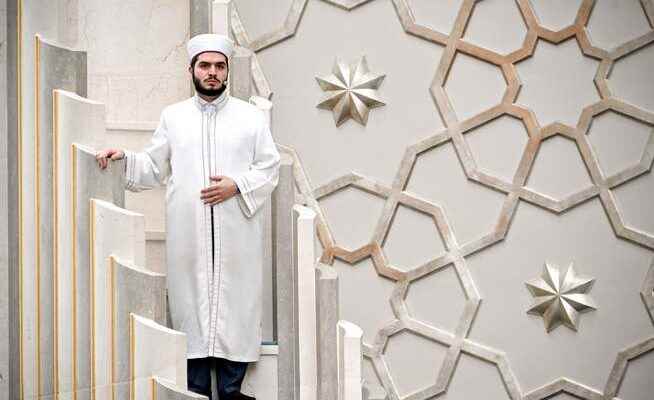The Islamic call to prayer sounded publicly for the first time this Friday in the cathedral city. Some see religious freedom in practice, others see it as a demonstration of the power of political Islam.
Mustafa Kader is the imam at the mosque of the Turkish religious authority Ditib in Cologne, North Rhine-Westphalia.
At 1:25 p.m. the time has come. With a haunting voice, the muezzin of Cologne’s central mosque recites the “Adhan”, the ritual call to Islamic prayer. In Arabic he sings and testifies that there is no god but Allah and that Mohammed is his prophet. He could not climb one of the two minarets decorated with the crescent moon. These are mere dummies and hollow inside. Two loudspeakers to the left and right of the high entrance doors therefore transmit his singing from inside the church to the forecourt.
The connection doesn’t seem to be the best. It sounds flickering from the speakers. Despite the drizzle, hundreds of believers have gathered outside. Pious old women and men are among them, as well as families with small children. However, it is mainly young men who dominate. Some look very confident as they film the call to prayer on their cell phones. The crowd replies with a triple “Allahu Akbar” when he is over.
Counter-demonstrators across the street
That’s not normally the case, says a man who came all the way from Karlsruhe. “But today is a special one for us Muslims in Germany.” The non-Muslim public is hardly present on site this Friday. Less than two dozen counter-demonstrators have gathered on the opposite side of the street from the mosque. Just as many police officers frame them. “No muezzin call in Cologne: The public space must be ideologically neutral,” demands a banner. “The headscarf is a symbol of gender apartheid” is another. A few residents stand on their balconies and look at the swarm of believers and many journalists.
The call lasts less than three minutes and is thus well below the maximum permissible five minutes. In addition, it can only be heard on Fridays between 12 p.m. and 3 p.m. The city of Cologne and Ditib – the Turkish-Islamic Union of the Institute for Religion e. V. – contractually agreed on Wednesday. The central mosque in Cologne’s Ehrenfeld district, which is supported by the largest Sunni Islamic organization, is so far the only mosque in the city that has submitted an application for a public muezzin call and meets the requirements.
The requirements: The call to prayer must not be louder than a normal conversation, which corresponds to around 60 decibels. This must be proven by a sound report. In addition, the neighborhood must be informed and a contact person named.
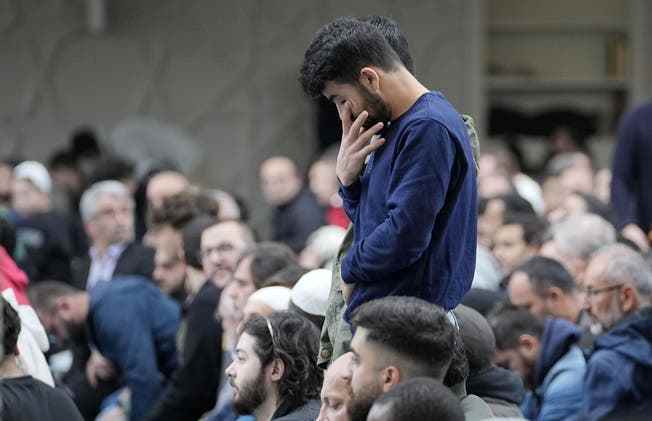
Male believers in the Cologne Central Mosque.
Mosque became a stumbling block
A year ago, the non-party Mayor of Cologne, Henriette Reker, announced the “model project”. This was preceded by corresponding applications from mosque communities. So far, however, only the Ditib Mosque has taken the bureaucratic route. It has maintained the largest mosque in Germany for several years. In 2018, Turkish President Recep Tayyip Erdogan even attended the inauguration. That caused an uproar. The mayor stayed away because she wasn’t allowed to speak. The mosque, intended as a symbol of integration and massively promoted by city officials, became a stumbling block.
Ditib knows that it has a bad image. Critics accuse her of being an extension of the Turkish state and of representing a conservative Islam that is not interested in integration. The Berlin Islamism expert Ahmad Mansour therefore warned a few days ago. The call is a demonstration of the power of political Islam. “The conservatives feel confirmed, see this as an important step towards the Islamization of Europe and will always demand more.”
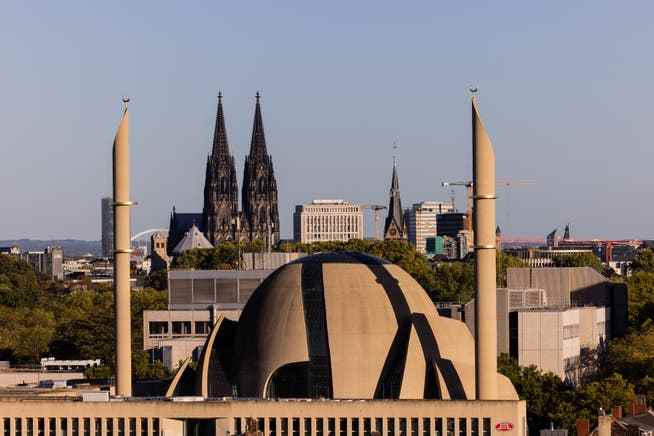
The central mosque of Ditib in Cologne-Ehrenfeld is the largest Islamic house of worship in Germany. In the background the Cologne Cathedral.
At an information event on Thursday evening, the representatives of Ditib try to dispel this impression. It’s all about spirituality and religious freedom and not about power. And of course you want the consensus with the neighborhood.
An elderly local resident – because they didn’t reveal their name when asked – spoke up. She has lived in the neighborhood for decades. From her point of view, not much will change, sound reinforcement plans or not, she says. At least since the pandemic, the high doors to the mosque have been wide open on Fridays to guarantee good ventilation. As a result, the reputation has already reached the outside world. She could still hear that very well in her nearby street. You don’t mind. In her view, it’s all a lot of ado about nothing.
“We were not granted any privileges”
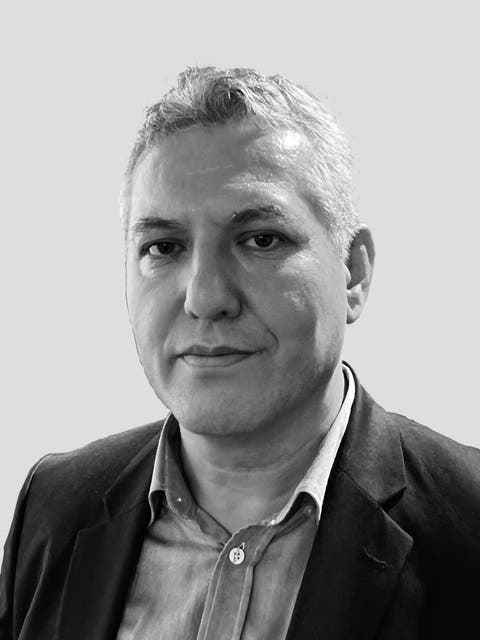
Zekeriya Altug represents Ditib.
Yes, practically not much will change, but legally, Zekeriya Altug replies. He heads the department for society and cooperation at Ditib. «The city of Cologne has not granted us any privileges. Rather, it was about how we can exercise our constitutionally guaranteed right to freedom of religion in such a way that it meets with social acceptance,” he says.
In fact, German pollution control is the biggest enemy of the Islamic call to prayer. In itself, this does not require approval, but its volume does. In a residential area, the regulations are of course stricter than in an industrial area. And if there is a hospital or a retirement home nearby, the situation is different again. In addition to the legal issues, there are those of social acceptance. In order not to endanger this, most mosque communities in Germany have so far refrained from calling.
The Catholic Church in Cologne, whose bells have shaped public life there for centuries, is relaxed about the process. As city dean, Robert Kleine is their highest representative in the cathedral city. “Let’s leave the church in the village and the mosque in the city,” says the monsignor with a Rhenish accent. Cologne will not become Cairo. After all, the reputation is tied to very strict requirements.
And it is also the right of Muslims to audibly call to prayer. Article 4 of the Basic Law also guarantees them the freedom to practice their religion. However, he sees the Ditib critically. The association must ask itself whether it has both feet on the ground of the pluralistic society. He is convinced that the fact that Ditib, of all people, is making the mark is a major factor in the excitement.
Church sees no prelude to the Islamization of Cologne
However, the clergyman cannot see a dam breach or a prelude to the Islamization of Cologne. “Christianity is not being pushed back by Islam, but by secularism.”
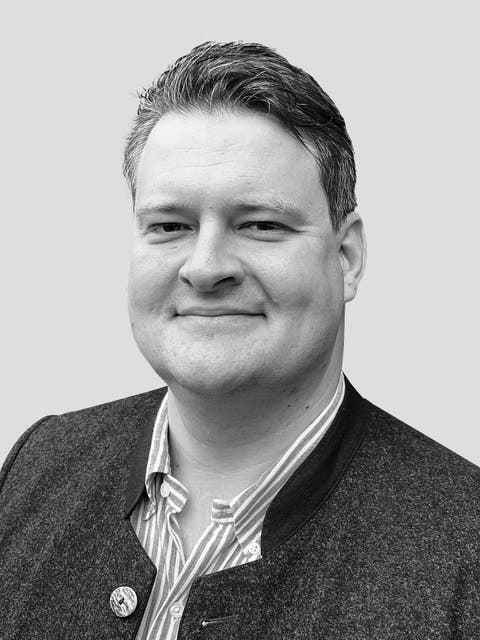
Christer Cremer is spokesman for the AfD in Cologne.
The AfD sees it differently. As the only parliamentary group in the Cologne city council, it has submitted a motion against the model project. “This will change the city. Islam will be more present – and only a few kilometers away from the cathedral, »says Christer Cremer, spokesman for the AfD Cologne, over a cup of coffee and points in the direction of the central mosque. It’s almost in the downtown area.
The forty-year-old engineer does not accept the point that Muslims only exercise their right to freely practice their religion. Of course, there is freedom of religion in Germany. Muslims are entitled to it too. But after all, you are in a culture shaped by Christianity. In addition, it does not need the reputation. Apps have long been calling for prayer. So it is nothing more than a demonstration of power by an organization controlled by the Turkish state.
The CDU is also critical of the call to prayer
The Cologne CDU is also critical of the muezzin call. But there they know that there is nothing legally to be done against Ditib’s application. Somewhat helplessly, Bernd Petelkau, the chairman of the CDU parliamentary group in the city council, refers to the “gentlemen’s agreement” made at the time of construction. According to this, a muezzin call should be avoided permanently. “Therefore, the minarets were only stylized and not expanded. The renunciation of the call was and is an important building block for the acceptance of the mosque in the public.»
And she sees calls to prayer nationwide critically. According to a survey In October 2021, 76 percent of Germans rejected the idea that the muezzin call would be heard in Germany just as naturally as the ringing of church bells. Only 18 percent were in favor of it. Nevertheless, the call to prayer should have a signal effect. Other Cologne mosque communities will soon follow suit and also submit applications. There is talk of about ten at the moment. In this way, Islam becomes unmistakable in Cologne – at room volume.
